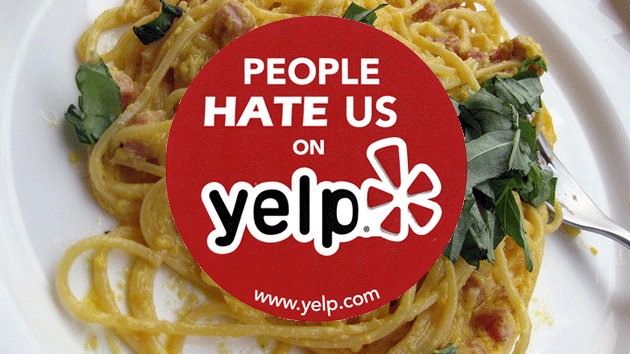
<a href="http://www.istockphoto.com/photo/paranoia-6461386">Swilmor</a>/iStock
Matthew White was getting nervous. It was the fall of 2013, and White believed he was stuck with a botched hardwood-floor job. The stairs weren’t rebuilt to code, multiple doors would no longer fully open, boot prints were embedded in the varnish—the list went on. Convinced that many problems would never be fixed to his satisfaction, White logged into Yelp and gave his Denver-area contractor, Footprints Floors, the first of two scathing reviews. “Absolutely horrible experience,” he wrote. “The quality of the work is absolutely deplorable. Be warned!”
Six months later, after negotiations to complete the job and pay for the work fell through, Footprints sued White for civil theft, intentional interference, and defamation. The company claimed in a settlement offer and initial legal proceedings that White’s online reviews had caused it to lose $625,000 worth of business, or $250,000 in profits—for which it demanded $125,000 in compensation. Footprints later lowered its defamation claim to just $1, but by then White had removed the reviews and spent $60,000 on legal fees. He settled the overall case in April for $15,000. “We couldn’t afford to keep fighting,” says White’s fiancée, Amanda Jameer.
Consumer advocates refer to legal claims that have little chance of prevailing in court but a lot of potential to silence critics, especially ones of modest means, as Strategic Lawsuits Against Public Participation. Footprints maintains that its suit wasn’t a SLAPP because it was filed months after White posted his reviews, was primarily about his failure to pay his bill, and involved a legitimate defamation claim. White counters that defamation was at the center of the claim before Footprints’ attorney acknowledged in an email that the damages were “too difficult to prove.”
Historically employed by powerful corporate interests against activist groups, college professors, and journalists, SLAPPs have proliferated more recently in response to comments posted by ordinary people on crowd-sourced review sites like Yelp. As these reviews can sometimes make or break a company’s reputation and affect sales, anybody with an opinion and a smartphone stands to get SLAPPed. Twenty-eight states and DC have passed laws intended to discourage such suits. There is no such federal law, despite years of efforts by consumer, media, and activist groups.
That may soon change with the addition of a powerful new ally: Yelp. Last year, the $3 billion San Francisco company opened a political office in Washington and began assembling an unprecedented coalition of technology interests to push for SLAPP reform. The resulting bipartisan bill, the Speak Free Act, was introduced in the House in May.
“This issue is really one that hits close to the heart for Yelp,” says Laurent Crenshaw, who handles national policy for the company. While federal law already shields websites from liability for statements made by their users, Yelp sees a business case for bulking up free-speech protections for Yelpers. “The concern is that these types of lawsuits, even if not incredibly common, will have a chilling effect on people’s engagement online.”
There are no reliable estimates of how many SLAPPs are filed annually, though examples abound. Aaron Schur, Yelp’s senior litigation director, says the company hears on a regular basis from users who report being sued by the subjects of their reviews. “Often it is the case that even if the claim is meritless, they can get the speech at issue withdrawn,” he says.
The Speak Free Act aims to curb this brand of censorship. In any speech-related case pertaining to a “matter of public concern”—a category that includes statements by activists and the press but also most online reviews—the aggrieved party would have to prove from the outset that he’s likely to prevail. Otherwise, the suit is automatically dismissed “with prejudice,” allowing the defendant to recoup legal fees. In the Footprints case, a judge would weigh the company’s evidence for defamation and decide whether that portion of the lawsuit was valid.
Anti-SLAPP laws exist in both red and blue states, but past support for national bills has been partisan. The Citizen Participation Act, a federal anti-SLAPP bill introduced in 2009, didn’t get a single Republican cosponsor. And most supporters of the Public Participation Project (PPP), a coalition pushing for anti-SLAPP laws, are either media organizations or progressive interest groups such as US PIRG, Greenpeace, and Amnesty International.
Yelp’s involvement has broadened the appeal. In 2013, its vice president of public policy, Luther Lowe, won support for anti-SLAPP legislation at a meeting of the American Legislative Exchange Council, a corporate-funded right-wing group better known for drafting stand-your-ground and voter ID laws. Yelp also landed endorsements from two major tech industry groups, the Internet Association and the Consumer Electronics Association, bolstering the case that SLAPP reform is business friendly. The Speak Free Act is the first national anti-SLAPP bill with significant GOP backing—it is sponsored by Rep. Blake Farenthold, a Texas tea party Republican, and supported by the conservative advocacy group FreedomWorks. The bill’s 10 cosponsors are evenly split along party lines.
Since the bill’s introduction, Yelp has continued to build its anti-SLAPP coalition, consulting with the likes of Facebook and Google, and even the Motion Picture Association of America. “Yelp’s involvement has been huge,” says PPP policy director Evan Mascagni. “It has been really tremendous for the cause.”
Yelp’s activism, however, may anger critics who think it doesn’t do enough to police and remove inaccurate reviews. A few businesses have even tried taking Yelp to court, accusing it of unlawful behavior for soliciting money in exchange for hiding negative comments—a judge tossed the case on the grounds that such practices are legal. (In any case, Yelp has a clear policy against them.) Attorney Mitch Langberg, who represents Nevada casino owners and who faced off against Yelp when he tried to make it easier for defamed business owners to sue under that state’s anti-SLAPP law, complains that Yelp is willing to host “commercially terroristic” reviews written by people who may be business competitors or disgruntled former employees.
Footprints Floors owner Bryan Park flagged White’s Yelp reviews for removal using a button on the site. But they ultimately remained active. White also posted comments critical of Footprints on his own website and that of the local Better Business Bureau. Though a spokesman, Park maintains that White defamed him in multiple ways, including when he wrote on Yelp, “Footprints believes there is nothing wrong.” Park says he’d never claimed the job was complete, and that he had offered to go back and fix any problems, but was prohibited by White from doing so. “I personally did everything I could to meet his needs,” Park said. “He still wasn’t satisfied, and he made online comments that were not true.” (White insists that not all of his concerns were addressed, and calls Footprints’ offer “inadequate.”)
White wants other reviewers to feel free to speak openly. He has been talking with a state senator about introducing an anti-SLAPP bill in 2016. “People should not be threatened or have to pay a lot of money in attorney fees just because they relay a real-life experience,” White says. “So what Amanda and I want to do is turn something that was very negative and costly for us into something positive for others.”
Yelp uses a variety of tools to try to keep business disputes from boiling over. Pattern recognition software automatically suppresses reviews that are deemed likely to be malicious. A user support team scrutinizes and pulls down flagged reviews that violate its user guidelines. But above all, Yelp encourages businesses to respond on the site and clarify any inaccuracies. “Courts have repeatedly said that the response to defamatory speech isn’t enforced silence—it’s more speech,” says Schur, Yelp’s litigation director. “People aren’t stupid. They can read the review and the response and make up their own minds.”








